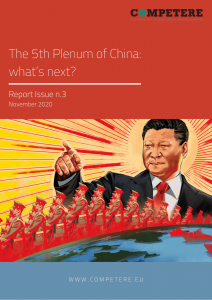The 5th Plenum of China: what’s next? – Report by CompetereREPORT ISSUE N.3 - NOVEMBER 2020
The 5th Plenum of China: what’s next?
What does the communiqué of the Central Committee of the Chinese Communist Party at the end of October tell us? In a changing geopolitical and economic landscape, China has issued a set of guidelines for the country for the next 5 years. How China is going to challenge Western democracies?
Edited by Stefano Sartorio
READ THE FULL REPORT ON THE CHINESE FIVE-YEARS STRATEGY >>
The information contained in the communiqué published in the Fifth Plenum of the China’s Communist Party is of considerable importance for those who want to understand the future of China. The new Competere report “The 5th Plenum of China: What’s Next?” summarizes and contextualizes the issue, dividing it into the four priorities identified by the Chinese authorities:
- Economy;
- Technology and innovation;
- Environment;
- Defence and Security.
WHY IT MATTERS
Double circulation, technological autarchy and qualitative growth are the three key words of this Plenum. For Western democracies and businesses, it is fundamental to know, interpret and anticipate the macro-changes involving the most dynamic Asian country in the last twenty years.
TOWARD AUTARCHY?
Despite proclamations, China is still far from achieving a full technological self-sufficiency. Semiconductors, batteries and unmanned air vehicles are among the products that China would like to produce itself. Too bad that to date, most of them are imported from abroad (often from US allies).
EXTERNAL DEPENDENCY
The principle of the double circulation (domestic economy as a priority with the support of foreign trade) frightened internationals commentators. Uncertainties about China’s real intentions to implement more protectionist policies still persists. On the other hand, the latest Foreign Investment Law signed with the EU and the latest ruling of the Supreme People’s Court (more protection for foreign investments) can be interpreted as signs of opening up. Main issue is to understand which sectors will be privileged.
THE QUALITATIVE GROWTH MANTRA
During the Plenum, Xi Jinping stressed that China will move towards qualitative growth and no longer just quantitative growth. After not having assigned to 2020 a result linked to the increase in GDP, it seems that the medium-term orientation focuses precisely on reducing inequalities and improving citizens’ welfare.
ENVIRONMENTAL CHALLENGES
The CCP has already achieved results on environmental issues in the last decade. With this Five-Year Plan the idea is to do even more. The highest goal to reach is carbon neutrality by 2060 (despite the opinion of some skeptical researchers).
A TIGHT SPOT
Italy will be squeezed between conflicting international interests. Made in Italy, the agri-food industry, shipbuilding and even the aerospace sector are at the center of numerous agreements reached in recent years with the support of Italian government. The New Silk Road (Belt and Road Initiative) should take a definitive shape as early as 2021 and Italy plays a fundamental role on the European side.
Political pressure will come from many sides. The European Union has not liked too much the Italian initiative of opening up towards the Dragon, which poses national security risks. The United States has downgraded Italy to a second-rate country. Joe Biden administration is expected to show general disinterest towards its Mediterranean ally, letting it slip into the Asian sphere of influence. China could exert pressure to accelerate its presence on the continent through Italian infrastructure such as ports, telecommunications and strategic networks.
READ THE FULL REPORT ON THE CHINESE FIVE-YEARS STRATEGY >>
ABOUT THE AUTHORS
Competere intende ringraziare tutti gli autori che hanno partecipato alla realizzazione del report.
Federico Campanile is an advisor on China affairs with a focus on institutional, social, and economic issues. He contributes to diverse online outlets writing about the Chinese Communist Party, international politics, and human rights.
Seohyun Han is now attending a master’s degree in China Studies at Renmin University Silk Road School. He has been Chief Editor at the Korea America Friendship Society Youth and intern at the Confucius Institute of Kyunghee University.
Elodie Cardonnet is a master’s student in “Contemporary China Studies” at Silk Road School (Renmin University of China), specializing in environment protection in China.
Domenico Repaci is currently a postgraduate scholarship student at the Renmin University of China. He is in the editorial board of the academic journal of Management and Ethical Finance from the Pontificia University of Santa Croce.
Stefano Sartorio is project manager and analyst at Competere – Policies for sustainable development. He collaborates with Taras Consulting in company internationalization in the Far East. He is also Vice President at Mondo Internazionale.

